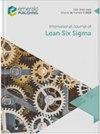Paradoxical tensions during industry 4.0 integration within health care: managing tensions for quality improvement
IF 3.8
2区 工程技术
Q2 ENGINEERING, INDUSTRIAL
引用次数: 0
Abstract
Purpose The integration of industry 4.0 has become a priority for many organizations. However, not all organizations are suitable and capable of implementing industry 4.0 because it requires a dynamic and flexible implementation strategy. The implementation of industry 4.0 often involves overcoming several tensions between internal and external stakeholders. This paper aims to explore the paradoxical tensions that arise for health-care organizations when integrating industry 4.0. Moreover, it discusses how a paradox lens can support the conceptualization and proposes techniques for handling tensions during the integration of industry 4.0. Design/methodology/approach This qualitative and in-depth study draws upon 32 semi-structured interviews. The empirical case concerns how two health-care organizations handle paradoxical tensions during the integration of industry 4.0. Findings The exploration resulted in six recurring technology tensions: technology invention (modularized design vs. flexible design), technology collaboration (automation vs. human augmentation), technology-driven patient experience (control vs. autonomy), technology uncertainty (short-term experimentation vs. long-term planning), technology invention and diffusion through collaborative efforts among stakeholders (selective vs. intensive collaboration) and technological innovation (market maintenance vs. disruption). Originality/value A paradox theory-informed conceptual model is proposed for how to handle tensions during the integration of industry 4.0. To the best of the authors’ knowledge, this is the first paper to introduce paradox theory for quality management, including lean and Six Sigma.医疗保健领域工业 4.0 整合过程中的矛盾张力:管理张力,提高质量
目的 整合工业 4.0 已成为许多组织的当务之急。然而,并非所有组织都适合和有能力实施工业 4.0,因为它需要动态和灵活的实施战略。实施工业 4.0 通常需要克服内部和外部利益相关者之间的若干矛盾。本文旨在探讨医疗机构在整合工业 4.0 时出现的矛盾张力。此外,本文还讨论了悖论视角如何支持概念化,并提出了在整合工业 4.0 过程中处理紧张关系的技巧。实证案例涉及两家医疗机构如何在工业 4.0 整合过程中处理矛盾的紧张关系。研究结果通过探索得出了六种反复出现的技术紧张关系:技术发明(模块化设计 vs. 灵活设计)、技术协作(自动化 vs. 人工增强)、技术驱动的患者体验(控制 vs. 自主)、技术不确定性(短期 vs. 长期)。原创性/价值 针对如何处理工业 4.0 整合过程中的紧张关系,提出了一个基于悖论理论的概念模型。据作者所知,这是第一篇将悖论理论引入质量管理(包括精益和六西格玛)的论文。
本文章由计算机程序翻译,如有差异,请以英文原文为准。
求助全文
约1分钟内获得全文
求助全文
来源期刊

International Journal of Lean Six Sigma
Engineering-Industrial and Manufacturing Engineering
CiteScore
8.90
自引率
15.00%
发文量
46
期刊介绍:
Launched in 2010, International Journal of Lean Six Sigma publishes original, empirical and review papers, case studies and theoretical frameworks or models related to Lean and Six Sigma methodologies. High quality submissions are sought from academics, researchers, practitioners and leading management consultants from around the world. Research, case studies and examples can be cited from manufacturing, service and public sectors. This includes manufacturing, health, financial services, local government, education, professional services, IT Services, transport, etc.
 求助内容:
求助内容: 应助结果提醒方式:
应助结果提醒方式:


